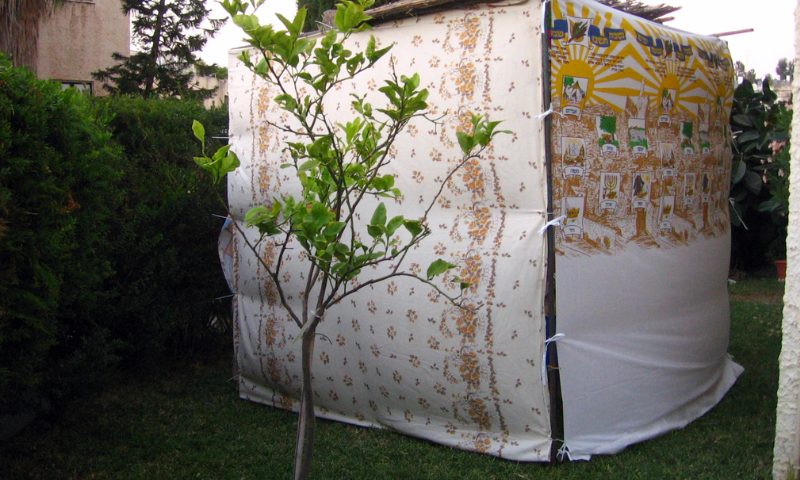Gershon Winkler
Isranet.org, Oct. 14, 2022
“But my father, he was unconcerned that he and his sukkah could conceivably – at any moment – break loose and crash down into the alleyway below. After all, he had seven special angels surrounding him.”
My memory isn’t as great as it used to be, and quite selective at that. For example, I have no trouble remembering a Talmudic aphorism I hadn’t thought of in 50 years or a prayer I hadn’t recited in 30, but I can easily forget to bring home toilet paper even when I just received a text in that regard, read it, duly noted it, and replied with an enthusiastic “absolutely.”
But among my warmest memories as a kid during this cooling season of Autumn is of my dear father climbing out the window of our fifth-story apartment in Brooklyn and into a tiny hut he had constructed on the platform of our fire-escape. It was the Sukkot holyday, and where else could he fulfill the mitzvah of eating in a ritual lean-to than on a fire-escape five floors above the bustling streets of Canarsie. And my mother, her eyes rolling upward way into their sockets and sighing at each trip to the window, lovingly handing him dish after dish, cup after cup, glass after glass, supporting his fulfillment of this special ritual which God instructed Moses to instruct our ancestors to perform every year around this time. The ritual? To dwell in a flimsy temporary shanty covered with leafy branches, decorated with inspiring scriptural passages and a print-out of a special prayer called Ushpizin, Aramaic for “Guests.” My father would invite these guests by reciting the prayer and they would arrive like clockwork every Sukkot, and wait patiently each meal for him to climb over and crawl across that paint-cracked window-sill to join them in their annual meal together. Specifically, they were the spirits of Abraham, Isaac, Jacob, Joseph, Moses, Aaron, and David, and on occasion a local squirrel. And we kids would sit inside the nice warm apartment slurping on kneidel soup while looking out the window at my father talking and singing with his seven invisible Ushpizin.
Having recently arrived from Denmark to the U.S., we had ended up in a predominantly non-Jewish neighborhood, so during the ensuing 9 days of the festival, the fifth-floor fire-escape got lots of puzzled glances from people below walking up and down Sackman Street. I found out years later that the local fire marshal had issued my father a citation giving him 10 days to take the sukkah down. I’m sure my father and his spirit guests had a good laugh on that one.
Not being a Jewish neighborhood, I can imagine what passersbyers and onlookers and other varieties of gawkers must have wondered as they craned their necks to view what must have appeared to them like some kind of gigantic bird’s nest nestled way up there on the fire-escape. Especially at night, when candles burned inside of it, and neighbors could hear my father singing and reciting prayers in Aramaic, and perhaps even the boisterous laughter of seven ancestral spirits being entertained by my mother’s humorous renderings through the window of everything. I wonder to this day what the folks on the street must have thought, though. Like what in the world is it with these Jews, that precisely when it starts to get cold and rainy, they build a hut with a leafy leaky roof to eat in? And this particular dude does it on a frigging fire-escape 5 floors up!
(And as for those of you who are reading this and are pissed off that no women ancestor spirits were included in the Ushpizin, no way would my mother have allowed it anyway. My father was still quite good looking back then.)
Who said aboriginals are the only ones who visit with their ancestors, speak to them, sing with them, create shrines for them. We do it too. Even on a frigging fire-escape! And rather than shock our ancestors with modern-day settings like inside the apartment where refrigerators are humming and radiators are sizzling, we honor their ancient manners by fashioning a special 3,500 year old hut so they would feel at home. Now, who does that?
My mother, the reason her eyes rolled a lot during Sukkot was because of the extent to which my father would go to make Sukkot happen no matter the circumstances. She knew the rules of our tradition, that even according to the strictest ritual laws, you weren’t required to sit in a sukkah if you didn’t have one, or if mitigating circumstances prevented you from comfortably building one, or if mosquitoes were assaulting you, or if it was raining, or if it was too cold, or if a rusty shaky, never tested fire escape was your only venue for constructing one.
But my father, he was unconcerned that he and his sukkah could conceivably – at any moment – break loose and crash down into the alleyway below. After all, he had seven special angels surrounding him.
And they still visit him to this day, albeit in his new and more sturdy sukkah in the skies – with diamonds.


